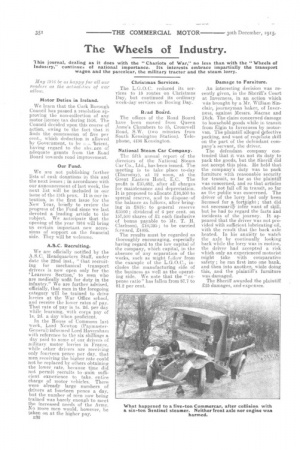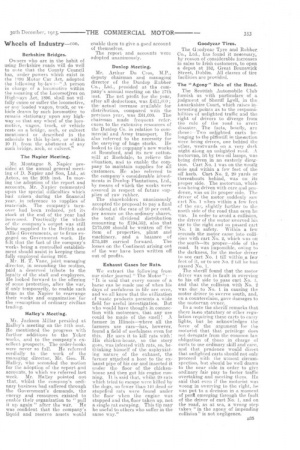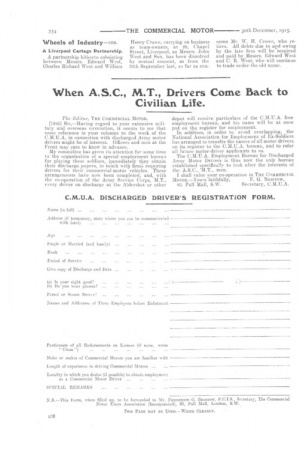The Wheels of Industry.
Page 28

Page 29

Page 30

If you've noticed an error in this article please click here to report it so we can fix it.
'I his journal, dealing as it does with the "Chariots of War," no less than with the "Wheels of Industry," continues of national importance. Its interests embrace impartially the transport wagon and the parcelcar, the military tractor and the steam lorry.
illoy 1016 be as happy for all our readers as the actualities of war allow.
Motor Duties in Ireland. .
We learn that the Cork Borough Council has passed a resolution approving the non-collection of any motor-licence tax during 1916. The Council decided upon this course of action, owing to the fact that it finds the commission of five per cent., which deduction is allowed by Government, to be iss, %dent, having regard to the abs.nce of adequate grants from, the Road Board towards road improvement.
Our Fund.
We are not publishing further lists of cash donations in this and the next issues ; in accordance with our announcement of last week, the next list will be included in our issue of the 13th prox. It is our intention, in the first issue for the New Year, briefly to review the progress of the Fund since we last devoted a leading article to the subject. We anticipate that the opening of the year 1916 will bring us certain important new accessions of support on the financial side. They will be welcome.
A.S.C. Recruiting.
We are officially notified by the A.S.C. Headquarters Staff, under date the 22nd inst., "that recruiting. for mechanical transport drivers is now open only for the 'Learners Section,' to men who are medically unfit for duty in the infantry." We are further advised, officially, that men in the foregoing category will be trained to drive Jetties at the War Office school, and receive the lower rates of pay. That rate of pay is -1s. 2d. per day while learning, with corps pay of 1.s. 2d. a day when proficient.
In the House of Commons last week, Lord Newton (PaymasterGeneral) informed Lord Havershain with reference to the six shillings a day paid to some of our drivers of military, motor lorries in France, while other drivers are receiving only fourteen pence per day, that men receiving the higher rate could not be replaced by others obtaining the lower rate, because time did not permit recruits to .gain sufficient experience to take, entire charge of motor vehicles. There were already large numbers of drivers at fourteen pence a day, but the number of men now being trained was barely enough tomeet the increased needs of the Army. No more men would, however, be taken on at the higher pay. 1330 Christmas Services.
The L.G.O.C. reduced its services to 18 'routes on Christmas Day, but continued its ordinary week-day services on Boising Day.
Read BoIrd.
The offices of the Road Board have been moved from Queen Anne's Chambers to 35, Cromwell Road, S.W. (two minutes from South Kensington Station). Telephone, 4136 Kensington.
National Steam Car Company.
The 'fifth annual report of the directors of the National Steam Car Co., Ltd., has been issued. The meeting is to take place to-day (Thursday), at 12 noon, at the Great Eastern Hotel, E.C. The profit is £33,682, after all charges for maintenance and depreciation. It is proposed to allocate £16,500 to special reserve, and to dispose,of the balance as follows, after bringing in £618: to general reserve £3000; dividend of 6 per cent. on
157,500 shares of each (inclusive of bonus payable to Mr. T. H. Clarkson), £10,395; to be carried fc.rward, £4405. The results must be regarded as thoroughly encouraging, especially having regard to the low capital of the company, which capital, in the absence of any separation of the works, such as might fallow from the example of the L.G.O.C., includes the manufacturing side of the business as well as the operating side. We note that the "expense ratio" has fallen from 87.7 to 81.2 per cent. Damage to Furniture.
An interesting decision was recently given, in the Sheriff's Court at Inverness, in an action which was brought by a Mr. William Sinclair, journeyman baker, of Inverness, against Messrs. Macrae and Dick. The claim concerned damage to household goods while in transit from Elgin to Inverness by motor. van. The plaintiff alleged defective packing, and want of requisite skill on the part of the defendant company's servant, the driver.
The defendant company contended that it was not its duty to pack the goods, but the Sheriff-did not accept this plea. He held that the company's duty was to pack furniture with reasonable security for tranSit, so far as the plaintiff was concerned, and so that articles should not fall off in. transit, so far as the public was concerned. The driver of the lorry had only been licensed for a fortidg-ht; that did not necessariar infer want of skill, but he had to regard the facts and incidents of the journey. It appeared that the driver was not provided with sufficient lubricating oil, with the resultthat the hack axle heated. In his anxiety to watch the axle by continually looking back while the lorry was in motion, the driver had accepted a risk which only an experienced motorist might take with comparative safety ; he ran first into one bank, and then into another, while doing this, and the plaintiff's furniture was damaged.
The Sheriff awarded the plaintiff £25 damages, and 'expenses. Berkshire Bridges.
Owners who are in the habit of using Berkshire roads will do well to note that the County Council has, under powers which exist in the 196 Motor Car Act, adopted the following by-law :---" A person in charge of a locomotive within the meaning of the Locomotives 011 Highways Act, 1896, shall not wilfully cause or suffer the locomotive," or any loaded wagon, truck, or vehicle drawn by such locomotive to remain stationary upon any highway so that any wheel of the locomotive, • wagon, truck, of vehicle rests on a bridge, arch, or culvert mentioned or described in the schedule to this by-law, or within 10 ft. from the abutment of any such bridge, arch, or culvert.'
The Napier Meeting.
Mr. Montague S. Napier presided at the annual general meeting of D. Napier and Son, Ltd., at Acton, on the 20th inst. In moving the adoption of' the report and accounts, Mr. Napier commented upon the special difficulties which had arisen during the financial year, in reference to supplies of materials. The company's turnover had been reduced, yet its stock at the end of the year had increased. Practically the whole of the company's output was still being supplied to the British and Allied Governments, or to firms engaged on Government work. He felt that the fact of the company's works being a controlled establishment should assist in keeping them fully employod during 1916.
Mr. H. T. -Vane, joint managing director, in seconding the motion, paid a deserved tribute to the loyalty of the staff and employees. He looked forward to the offering of some Protection, after the war, if only temporarily, to enable such firms as the Napier to rearrange their works and organization for the resumption of ordinary civilian trading.
Halley's Meeting.
Mr. Jackson Millar presided at lialley's.meeting on the 14th inst. He mentioned the progress with further additions to the Yoker works, and to the company's excellent prospects. The order-books were never so full. He'roferred cordially to the work of the managing director, Mr.. Geo: H. Halley, who seconded the motion for the adoption of the report and accounts, to which we referred last week. Mr. Halley pointed out that, whilst the company's ordinary business had suffered through the Government's demands, the energy and resources existed to enable their organization to " pull it up again " after the :wain He was confident that the company's liquid and reserve assets would enable them to give a gocd account of themselves.
The report and accounts were adopted unanimously.
Dunlop Meeting.
Mr. Arthur Du Ctos,
deputy chairman and managing director of the Dunlop "tubber Co., Ltd., presided at the company's annual meeting on the 17th inst. The net profit for the year, after all deductions, was 1111,0W ; the actual increase availablefor distribution, compared with the
previous year, was 1;61,000, The chairman made frequent references to the extensive resources of the Dunlop Co. in relation to commercial and Army transport. He also referred to the necessity for the carrying of huge stocks. He looked to the cowpony's new works at Bromford, and its new cottonmill at Rochdale., to relieve the situation, and to enable. the company to maintain supplies for all customers. He also referred to the company' .s considerable nivestments in Dunlop Plantations, Ltd., by means of which the works were assured in respect of future supplies of raw rubber.
The shareholders unanimously accepted the proposal to pay a. final dividend at the rate of 20 per cent. per annum on the ordinary shares, the total dividend distribution amounting to £194,352, also that £175,000 should be written off the item of properties, plant and machinery, and a balance of £75,528 carried forward. The losses on the Continent arising out of the war have been written off out of profits.
Exhaust Gases for Rats.
We extract the following from our sister journal " The Motor" :— " It is said that every ounce of a horse can be made use of when his days of usefulness in life are over, and we, all know that the utilization of waste products presents a wide field for useful investigation. But who would have thought in connection with motorcars, that any use could be made of the smell! A farmer in Illinois—where all the farmers use cars—has, however, found a field of usefulness even for this. He uses it to kill rats with His chicken-house, so the story goes, was infested with rats, so, bethinking himself of the •asphyxiating nature of the exhaust, the farmer attached a hose to the exhaust pipe, of his car and insertedit under the floor of the chickenhouse and then got his engine running. It is said that, whilst '20 rats. Which fried to escape were killed by the dogs, no fewer than 140 dead or stupefied rats were found under the floor when the engine was stopped and thenfloor taken up, nota single rat escaping.This tip may be useful to others who suffer in the same way."
Goodyear Tires.
The Goodyear Tyre and Rubber. Co., Ltd., has found it necessary, by reason of considerable increases in sales to Irish customers, to open a depot at 182, Great Brunswick Street, Dublin. All classes of tire facilities are provided.
The "Agony" Rule of the Road.
The Scottish Automobile Club furnish us with particularsof a judgment of Sheriff Lyell, in the „
Lanarkshire Court, which raises interesting points its to the responsibilities of unlighted traffic and the right of drivers to diverge from the rule of the road to avert disaster. The facts,. briefly, are these :—Two unlighted carts belonging to the pliintiff in the.,action were being driven, one behind the other, westwards on a very dark night. along an unlighted road. A motorvan, lit by two oil lamps, was being driven in an easterly dirention. Cart No. I was on the wroirg side and within a few feet of the off kerb. Cart No. 2, 20 yards or thereabouts behind, was on its proper side, The motorvan, which was being driven with core and prudence, was on its proper side. The driver of the motor suddenly saw cart No. 1 when within a few feet of the car, slightly further to the north side of-the road than oven he was. In order to avoid a collision, the driver of the motor swerved his car to the right and so passed cart No. I in safety. Within a few seconds. ,the motor came_into collision with cart No. 2, which was on the south—its proper—side of the road. It was impossible, owing to the darkness, for the motor driver to see cart No. 1 till witHrna few feet of it, or to see No. 2 till be had passed No. -1.
The sheriff found that the motor driver was not. in fault in swerving to his off side to pass cart No. 1, and that the collision with No. 2 was due to No. 1 in causing the motor driver to swerve south, and, on a counterclaim, gave damages to the motorvan owner.
In a note the sheriff remarks that
there is,tio statutory or other regulation requiring these carts to carry lights, but he acknowledges the force of the argument for the motorist that that privilege does not derogate from the coalition law obligation of those in charge of carts to use ordinary skiRandeare, and that prudence would direct that nrilighted carts should not only proceed with the utmost circumspection, but.should be well drawn to the near side in order to give ordinary .fairplay .to. fasterntraffic overtaking and meeting them. He said that even if the motorist. Was wrong in swerving to the right, he was put to a decision in a moment of pea emerging through the fault of the driver of cart No.' 1, and on the road; as at sea, a wrong step taken "in the agony of impending collision" is not negligence.
A Livirpool Cartage Partnership.
A partnership hitherto subsisting between Messrs. Edward West, Charles Richard West and William
Henry Crowe, carrying on business as team-owners, at 28, Chapel Street, Liverpool, as Messrs. John West and Son, has been dissolved by mutual consent, as from the 30th September last., so far as con cerns Mr. W. IL Crowe, who retires. All debts due to and owing by the late firm will be received and paid by Messrs. Edward West and 0: R. West, who will Continue to trade under the (yld name.








































